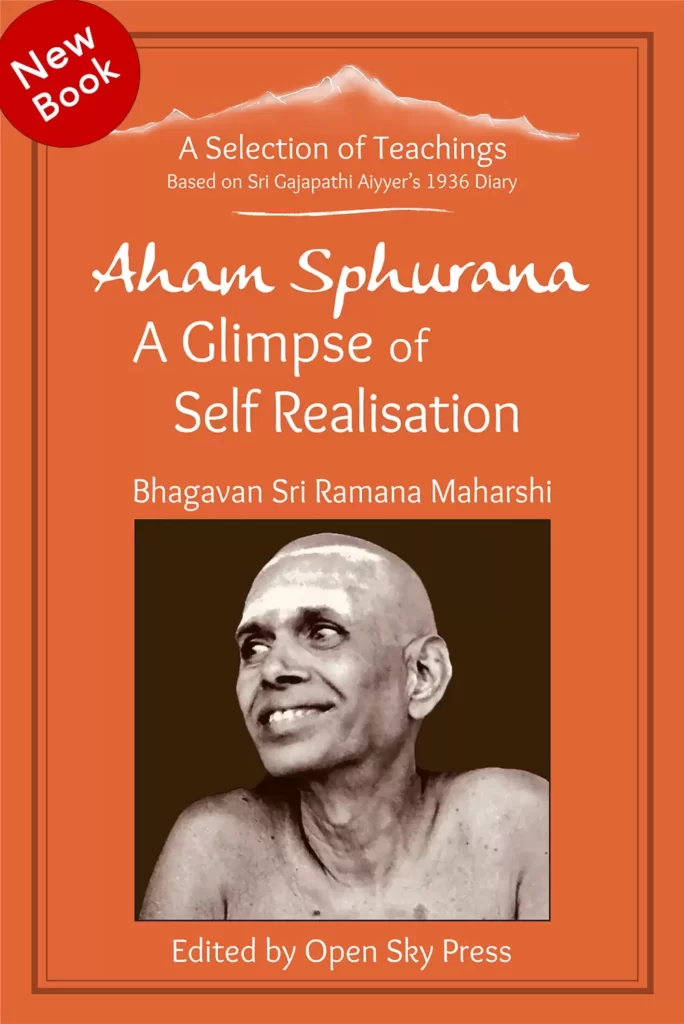
Aham Sphurana
A Glimpse of Self Realisation
New Book about Sri Ramana Maharshi

Available Worldwide
On www.openskypress.com and Amazon:

“In my opinion, Aham Sphurana, a Glimpse of Self Realisation, will become a Treasure Trove of Wisdom to the Seekers of Truth in general, and particularly to the devotees of Bhagavan.”
Swami Hamsananda – Athithi Ashram, Tiruvannamalai
Schopenhauer and Renunciation
Q.: I have heard that Bhagawan once spoke highly of Schopenhauer.
B.: He has discovered that the world is an inherently and incorrigibly unhappy place; he has also discovered that man’s true purpose is happiness; furthermore, he states correctly that extirpation of one’s personal will leads to Emancipation. However, what seems to be missing is practical technique. How shall the wille-zum-leben, which is the cause for all suffering, be defeated and annihilated? Will cannot be conquered by will. Mind cannot kill mind. Only absolute surrender can result in ruination of the wille-zum-leben or ego.
E.Z.: Schopenhauer is said to have been extremely impressed by the Upanishads.
Q.: Schopenhauer is also said to have been a follower of the Buddha’s teachings; he likewise contended that desire alone is the cause for all sorrow in life. This is evident from his writings.
…………Long text in German ending: …….thus almost all old faces wear the expression, which in English is called‚ disappointment.’
B.: Yes – and by that time it is usually too late to do anything. If one’s vasanas are to be destroyed and Realisation achieved, perfect vairagya [renunciation] is necessary. Vairagya is not the petty frustration that develops toward the world when one has failed in all of one’s pursuits and is left with no successful standing to speak of in the world; vairagya is the matured conviction that samsara is futile, pointless, and inherently devoid of meaning or purpose; it is the former that Herr Schopenhauer is referring to when he mentions that some elderly people seem to have expressions on their faces that could indicate presence of disappointment within the mind. This mood of despondence, disappointment, or frustration is not vairagya and it is certainly not enough to check one’s vasanas; it is merely a transitory inclination of mind that soon passes off without having left behind any noteworthy consequence; vairagya is not like this. Vairagya scorches the mind. Repeated failures and frustrations in life might lead to mental bitterness, which does harm but not good; but if such adverse experiences in life must result in or blossom into vairagya, which does good but not harm, Guru’s Grace is absolutely necessary.
Q.: How to get Guru’s Grace?
B.: By surrendering yourself unconditionally.
Q.: Whom shall I surrender to?
B.: Absolute surrender cannot involve surrendering “to” anything. Surrendering to God can at best be called partial surrender. To totally surrender is to simply altogether LET GO. If everything is given up including the renouncer or relinquisher, only Reality remains, and that alone is the true Self. Asking “Whom shall I surrender to?” is the same as asking “If I am to let go, who will catch me as I fall?”. You want to be “caught” again; that is why this question arises. Mature souls want to fall; they do not want to be caught at all. What is the point of letting go if you would only be caught again? So, the paripakvi does not surrender “to”; he simply surrenders.
Q.: And thereafter?
B.: There is no thereafter.
Q.: I meant, what is the state after surrendering perfectly?
B.: Is the one that surrendered perfectly asking this question? Can he?
Q.: No, but I am asking.
B.: The only way to truly know is to yourself do it and see. There cannot be anything to witness the Self.
Edited by John David Oct 2021







